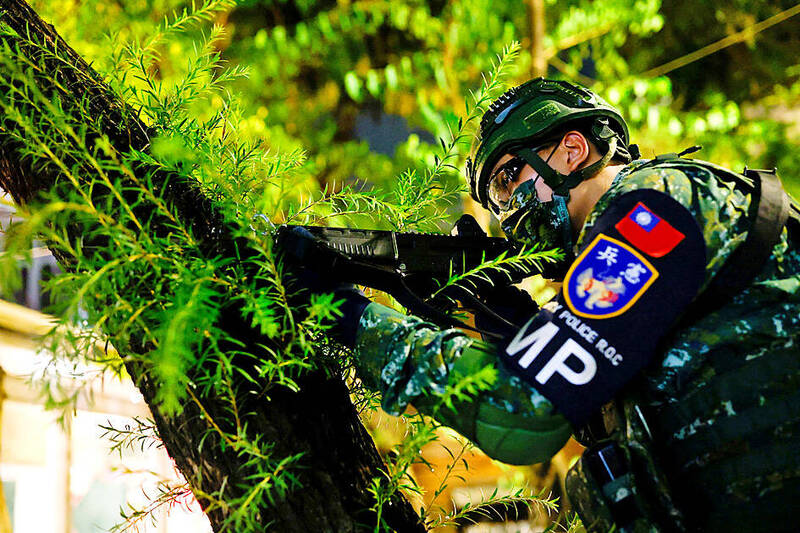《TAIPEI TIMES》 Committee to gather to boost resilience

A soldier takes part in a drill at Taipei Main Station in Taipei on July 26 last year. Photo: Ann Wang, Reuters
NATIONAL SECURITY:Taiwan has a strong need to be resilient due to its importance to global industries and the global economy, the head of a civic organization said
By Chen Yun, Chung Li-hua and William Hetherington / Staff reporters, with staff writer
The Whole-of-Society Defense Resilience Committee — which is aimed at promoting society-wide involvement in national defense — is to hold its first meeting on Thursday, with four points of focus aimed at boosting resilience, sources said yesterday.
The committee was established by President William Lai (賴清德) in June, a month after he took office, along with the National Climate Change Strategy Committee and the Healthy Taiwan Promotion Committee.
Lai at the time said that Vice President Hsiao Bi-khim (蕭美琴) would chair the committee, with Presidential Office Secretary-General Pan Men-an (潘孟安) and National Security Council Secretary-General Joseph Wu (吳釗燮) serving as its deputy conveners, while Minister of the Interior Liu Shyh-fang (劉世芳) would be its executive secretary.
The defense committee would focus on strengthening national defense, disaster prevention and response measures, and the resilience of society to disasters, sources said.
The committee is to coordinate with local civic organizations, central police and fire-fighting authorities, the central government and national defense agencies to formulate an overall security strategy for the country, they added.
American Institute in Taiwan (AIT) Director Raymond Greene, during his address at an emergency preparedness exercise on Saturday organized by a local non-governmental organization, said Taiwan’s ongoing efforts to boost its all-out-defense capabilities would benefit the entire world as well as Taiwan, given that the nation is at the epicenter of global semiconductor manufacturing.
The AIT and the Taiwanese government have been working hand in hand to deepen Taiwan’s resilience “as it faces unprecedented threats, both natural and man-made,” he said, adding that the AIT also focuses on strengthening the nation’s energy resilience, cybersecurity and disinformation countering capabilities.
Kuma Academy chief executive officer Chu Fu-ming (朱福銘) yesterday said that academy chairperson Liu Wen (劉文) and cofounder Tseng Po-yu (曾柏瑜) would serve on the defense committee as consultants.
“In developed countries such as those in Northern Europe, national defense is part of basic education,” Chu said. “That type of training prepares people to respond to war-related disasters, and also natural disasters such as typhoons and earthquakes.”
Kuma Academy was founded based on the principle that public and non-military bodies should be more resilient so they can better respond to emergencies such as war and natural disasters, he said.
The need for resilience is particularly strong in Taiwan due to the importance of the nation to global industries and the global economy, he said.
Meanwhile, the Ministry of the Interior yesterday released a preview for planned amendments that would increase training for civil defense cadres from four to 12 hours annually.
The draft amendments also called for the implementation of a civil defense materials brigade, which is to be responsible for managing and distributing everyday supplies to the public following natural disasters or the onset of war.
There are about 20,000 civil defense personnel, about 20,000 volunteer law-enforcement personnel and about 40,000 volunteer firefighters in Taiwan.
However, 64 percent of the civil defense volunteers are aged 50 and older.
The draft amendment would also add new responsibilities for civil defense personnel and volunteers, including processing the identities of disaster victims, conducting surveys of public needs and handling logistical support for daily supplies.
The scope of volunteers at aid stations would also be expanded to include medical staff from clinics and pharmacies.
Training should be updated once or twice per year, and all registered volunteers should be called to participate, the amendments state.
Additional reporting by Huang Ching-yi and CNA
新聞來源:TAIPEI TIMES






















